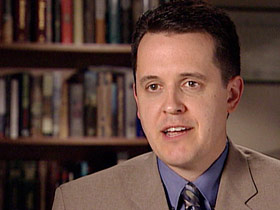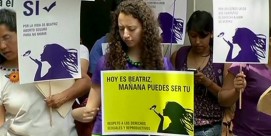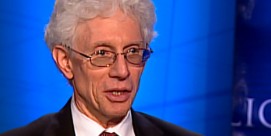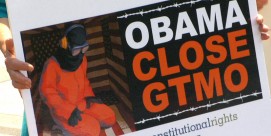In This Episode << SLIDE LEFT TO SEE ADDITIONAL SEGMENTS
Brian Stiltner Extended Interview
Read more of Kim Lawton’s interview about Iraq and just war with Brian Stiltner, associate professor of religious studies at Sacred Heart University in Fairfield, Connecticut:
Q: Three years ago, you wrote that the Iraq invasion did meet just war criteria. What do you think now?

A: Well, I’ve come to have misgivings and second thoughts. I think the just war criteria are a great framework for thinking through whether a country should, indeed must, go to war. Whether war can be just doesn’t always mean that it’s going to be absolutely right, without problems, but that it is urgent and necessary and the most ethical thing to do under the circumstances — the lesser of the available evils.
That means it’s always open to second-guessing, and one of the criticisms, maybe, of using these ideas is that either you get yourself into justifying something in the beginning that you[‘d] have second thoughts of, if you knew more information, or that you can always look back in hindsight and see things differently.
On the other hand, we do learn and change as time goes on. We learn more information, and so I think it’s really appropriate with this complex war and long engagement to keep looking back at what we knew then, what we know now, and asking whether we’d have made the same decisions. I personally came to the position that if I’d known more information, like much of the world, I would have made a different decision on my own personal opinions.
Q: Why? On what basis?
A: Well, from an ethical perspective, from a just war perspective, the first step is you have to have a just cause, and it’s on that issue — that’s one of the main issues that I see things differently. The causes that I identified, that most people identified, were the threat of Iraq’s weapons of mass destruction programs — nuclear, chemical, and biological weapons — that they presented a risk to the neighbors and to the free world, and that there was no — that Iraq wasn’t complying with UN weapons processes, with UN sanctions, before there were inspectors back in Iraq. That was a serious risk that I think really could have justified a war, made it just.
Once the inspectors were in, I still thought that Saddam was being very recalcitrant and was playing cat and mouse, such that I agreed with the hawks that that was a serious consideration and maybe we couldn’t let the situation go on indefinitely. But I think with a little bit of hindsight and looking at what the just war theory says, that you really have to have an imminent serious risk; that wasn’t the case in February and March of 2003. There were inspections going on. The catchphrase at the time was “give the inspectors more time,” and I think that’s right. I think it wasn’t necessary to have the rush to war.
Q: What about the humanitarian concerns, the plight of the Iraqi people? Has your thinking about that also evolved?
A: I and the other authors and thinkers and politicians whose opinions I respected on the war took the humanitarian concerns of the citizens of Iraq seriously. I was never sympathetic with “this has got to be a response to al Qaeda and to 9/11,” and that it was only because Saddam was a bad leader in terms of how he was not cooperating with the international community. He was a real dictator. It was definitely one of the most repressive regimes around the world. The Gulf War from 1991 continued to be, really, an unresolved situation. There [were], before the Gulf War [and] after the Gulf War, many kinds of repressions of various [segments] of his population. I think in that sort of situation, similar to weapons, though, you do have to look at how urgent something is. Are you at a crisis that can’t be addressed in any way other than, you know, really fast and immediate and aggressive action? And Iraq wasn’t in that situation at that time.
So for me, the humanitarian concern combined with the weapons concern pushed me over the top, but I think, in retrospect, each one of those would have had to be strong enough on its own. I think the Bush administration was really adding up a lot of reasons that were plausible, but thought, “Well, we have four or five reasons; they all add up to something.” One or more of them had to be something where, on the grounds of just cause and last resort, we don’t have other options for dealing with them — that we were at our last resort.
Q: And the criterion of proportionality?
A: That’s one of those things that’s part of the just war criteria that really — it leaves room for judgment. We don’t know how it’s going to turn out. Proportionality means in the long run, will there be more good over bad consequences? It does require the leaders to gather all the information they can and to make a prudent judgment and make sure that they are acting on their stated principles and that what they can reasonably envision will come about, and what they’ve committed themselves to seeing through, you know, has a good chance of coming out to a good outcome.
It’s probably on the sense of how things are coming out and not turning out well that so many people, many politicians, many Americans have had second thoughts and misgivings. It’s difficult to think through. I don’t want to think that the decision makers could have known that the insurgency would be as strong as it was. But what I think happened, and where I think some ethical shortcomings lie, [is] that we have pretty good evidence and arguments that the key decision makers did not do sufficient planning for the postwar. They made some alliances with some of the more dubious groups. They thought they had a finger on the pulse of the Iraqi people and didn’t, you know, fully have that. There [were] problems with the military strategy that, I think, didn’t really have a good plan and enough troops to secure Iraq in the immediate postwar. I know that’s the realm where all the books about Iraq get written, all the political science books, and, you know, I don’t feel I can come down and make great factual claims about that. But I think it’s come to a pretty big consensus that planning for what happens next could have been much better, and that’s one of the real problems with the war.
Q: What led you to rethink your original position?
A: One was security from weapons programs. We can all see now, in retrospect, that the war wouldn’t have been necessary to protect us from any substantial weapons program and [its] imminent use. Whether, though, Iraq is really a safer country for the Middle East — the jury is still out on that. The possibility of its becoming a relatively democratic society, an accountable society — there is a lot of hope for that. There have been three significant free elections, but it’s also been a security situation where not only former regime elements but a lot of foreign jihadists have come to the country. The unstable situation has led to internecine Sunni-Shiite conflicts that really could make the country plunge into a civil war, and in that case it would be, and to some degree is becoming, a training ground, an operation ground for Islamist terrorism rather than a safety situation. That’s where thinking about the planning of what would be the stability of the country afterward is — there [were] some errors in judgment there that are morally culpable.
Not only does [the] proportionality criterion say we need to look at how things will be improved in the long run, based on reasonable good judgments and being aware that things can go wrong. The way the just war tradition tended to look at that was still pretty shortsighted, I think. It was still basically about what would be the situation after the hostilities ended, once peace was sued for. I think proportionality tended traditionally to think about destruction to the country and the loss of life on both sides. Traditionally, then, just war theory might have looked at a situation like the Iraq war and said, after two months of fighting when we said the war was officially over, it was a pretty proportional war. There was not a lot of loss of troop lives at that point and — I don’t know, I mean, we’re still trying to figure out the statistics on Iraqi lives, but there wasn’t a disproportional, I think, loss of Iraqi civilian life during that time. I mean, the focus was on soldiers and fighters and the Iraqi army.
Just war tradition has some ideas within it that have been developed within recent years, really in the past decade or two, and people have proposed the concept of justice after war. So just war theory has justice in going to war, justice fighting in war, and now justice after war. What are the responsibilities of countries that are successful, that said they have a just cause, in the first place, to the country? That realm and thinking [are] still really being developed, but it would be to bring closure and legitimacy to the political situation you’ve created.
I guess that means two things. One, it means that you really don’t just go in, mess up a country, and leave. That was the concern I had before the war, based on the way I thought our administration might operate. I guess I’d say to their credit, they did not do that. There maybe would be a certain political popularity in just saying “victory” and leaving and going home. They recognize that would create such instability in Iraq that that would be wrong to do and, you know, they’ve worked pretty hard to try to midwife a political process that will put Iraq back in free hands.
I think it’s a bit of a mixed case on justice after war. I think our intentions have largely been in the right place there. Some of the errors in thinking would be on the way you would get to that “after” situation going through a war, whether you’d get enough support from the world community and from other Arab nations to really make it a success. I think there was a tone-deafness on how the U.S. and the UK were going forward with this war without enough real international partners, and that hampers what you can do in the “after” situation.
Just war theory has about six or seven criteria that look at how political leaders make the decision going to war, but also how a democratic citizenry also participates in that, supports or doesn’t support the leaders in that. It’s having a just cause; it’s having the right or legitimate authority — some of those questions have to do with the role of the UN, the role of other countries; and feeling that you’ve come to a last resort or having an argument that you’ve come to a last resort; and having an argument that this will be better in the end than what will be the inevitable negative consequences as well.
What I thought of it going in and why I changed is not just on the bare stating of the causes, but really on whether the whole package was there in terms of seeing that an action of a war was also really, urgently necessary at this point, that it had reached the last resort and that it was the best tool we had at our disposal. The whole free world or community of nations’ thinking got a bit bifurcated into, you know, “Let Saddam do what he will or fight this war now.” While I fully agree that with any kind of leader and country like that, it’s hard to have a lot of leverage — I mean, part of their point is to keep sticking it in the eye of other nations — there were some other options. So I think it’s about the whole package coming together, and I can’t say now, in retrospect, that it had come to a last resort.
Q: Is it fair to reassess after the fact? In hindsight things always look different.
A: Well, Monday morning quarterbacking is never entirely fair, but what is important is to think back, to look at how decisions are made and why they were made and what we might have known at the time, not completely new information that no one had. The argument often comes up, and it’s been presented to me, that everyone thought that Saddam had weapons programs. I agree that’s true. I agree that there was significant intelligence evidence, not just from politicians that maybe the critics of the war don’t like, but the Clinton administration registered serious concerns, all kinds of various reports of one sort or another. There’s really a dizzying array of information on this, and it’s really hard to keep up with it and to process it.
I started to have my misgivings when the reportage three months, four months after the war started about how the intelligence had been gathered, presented to the Bush administration, and what was the relationship between the Bush administration and the intelligence community? There was pressure, and I think it’s undeniable, put on the CIA to get a certain kind of interpretation of the evidence. I really see this as something in the middle ground. I don’t feel there was an attempt to lie and fabricate evidence about Iraq’s weapons programs, but I can’t honestly say that the evidence that I think the politicians had — they just looked at this and said wow, this is just an incontrovertible, strong case. There was a responsibility for them to really process what was unknown, what were the ambiguities. There [were] intelligence estimates from the CIA saying that there’s an interest that the Iraq regime has, but they likely don’t have the weapons at this point, especially nuclear, which is really “the” weapon of mass destruction. We tend to conflate a lot of weapons together. There was enough evidence where we’ve seen — that discussion of the State of the Union address and things like that — when they knew how weak the evidence was. Colin Powell — I based a lot of my own feeling on his presentation to the United Nations, and he repents of that speech. He wished he hadn’t given it, although he still says it was the right thing to do. I can’t live with that ambiguity. If we couldn’t have given that speech, then we didn’t have that kind of urgent cause and last resort, and therefore I don’t want to go along with that case. I think we should have thought of it differently.
Q: How would you summarize the evolution of your thinking on the ethical issues?
A: To think about whether war can be ethical is always a hard thing to do if you are a sensitive human being, if you are a religious thinker. I’m a Christian ethicist. There is always a strong moral command to be a peacemaker, to avoid harming the dignity of other people, even your enemies, and so going to war has to be a really somber and serious task that, in a sense, couldn’t be avoided. It can be necessary for justice, and I want to keep the just war theory viable for people not [to feel] that it gets abused in the cause of wars that shouldn’t have happened. Things have been going on where there should have been intervention — in Rwanda. The world community needs to put increasing pressure [and] perhaps military intervention in a place like Sudan may be necessary.
If we didn’t have good moral thinking about the Iraq war, that’s going to harm the effective and ethical use of just war theory, and I think that was the case for me with Iraq. You can bring it together on this debate that’s been going on within ethics about preemption versus prevention. It’s never been accepted in just war thinking that a war of prevention — to forestall a situation down the line that you don’t want coming to fruition, however good events may be — is legitimate. Rather, you can preempt, you can act in advance of what is really, clearly an imminent danger. The other person [is] about to strike, so to speak, so if you see a punch coming, you can start to defend yourself.
To keep just war theory on a firm ethical footing so it doesn’t get abused and subject to feelings that it’s just being used in the service of political argument or Monday morning quarterbacking, it is important to be cautious in its use. One important principle that ethicists are using and trying to get clear on in this new political situation of rogue states, terrorism, and weapons of mass destruction: What would be a preemptive war and what would be a war that tries to prevent future threats from emerging? I think the Iraq war emerges as one that was trying to be a preventive war, and I don’t think that can really fit under the ethical standards of just war thought.
If it was an argument for preemption, for trying to stop a punch that was on its way, then that would have been okay. What I came to see was that there was a lot of argument and evidence presented in the public forum that a punch was on its way, and we see now that wasn’t the case, and we could have thought more judiciously and cautiously about it.
It’s not just that we all didn’t know anything, but there [were] reasons for taking a more somber and careful look, and we didn’t need to have that rush to judgment.
Q: Was it difficult for you to say publicly that you had rethought this and had come to a different position?
A: Both things are difficult. It was difficult to take a stand in favor of the war at first, because it did really go against most of my friends, most people in American academia, I think, and against the tenor of the body of religious and Christian ethicists. It was not a popular war among my professional colleagues to start with. I thought the argument needed to be made. The reason I think I made it at the outset was I felt one side of the argument wasn’t being given its due, and there were claims on that side and I was convinced by them.
It was also hard to change. I didn’t want to feel I was just going back and forth. One of my friends said, “Well, if Iraq turns out to be a great thing 30 years from now, are you going to change your mind again?” I feel I can honestly say no. It’s always hard to change your mind. I just wanted to make sure I wasn’t jumping with the obvious dis-ease that everyone was feeling about the ongoing insurgency and the mounting deaths of Iraqi citizens and American soldiers. For me it really had to be on the basis of the principles and taking a careful, reflective look at what was known at the time, how ethical criteria were being used. I think a different decision should have been made at the outset, whatever will be the good outcomes. I’m still very hopeful and prayerful for a good outcome for the people of Iraq. I think we can still hope for that; I think we can still see our way through to that.
Q: Whether or not we were morally justified in going in, the reality is that we are there. What are some of the moral and ethical questions that should guide deciding when we leave?
A: It’s not an easy question, certainly, to think practically about what to do. The ethical guidance that can be given is also not easy, in some ways, because maybe like the argument for the war itself, there are some good arguments on both sides. I think that the just war framework and the concept of justice after war put most of the weight on the side of saying there’s an obligation for the nations that started the war to try and see it through to a conclusion of stability, security, and reformed society for Iraq. I think, practically, the idea of quick and dramatic drawdown of troops would inflame the situation, make it worse. It seem that, you know, to have American troops there is still necessary for getting Iraqi army, police, security forces on their feet.
The problem on the other side is it’s also pretty clear our presence is part of the inflaming of passions. It’s really unknown what would happen if we left. Would that take the power, the enemy out of the cause of the insurgency? I think we’re not at the situation yet where that would be the case. I think it’s too risky to really pull out our presence dramatically. I leave it to military and political decision makers to decide on what kind of, perhaps, reductions — and maybe some reductions gradually, you know, would show our intentions of trying to not be there indefinitely. But it’s a really tense and fearful time, because either way we go, the situation could be like this for some time.
Q: Prior to the war and even now, has there been enough consideration of the moral and ethical dimensions?
A: Being an ethicist, I’m disposed to say no, because I would like to see ethical considerations be more in the forefront for people. On the other hand, the political and the strategic always have some ethics built into them, so part of the task of the community of academics, of church leaders, of ethicists is to show people how there are ethical considerations being built into this discussion.
I think the problem was not so much that ethical considerations were not part of the public discussion all along, but that the ethical terms, like the political terms, got bifurcated, and it was really hard for people who were firm[ly] on two sides of this issue to see the moral considerations that the other side was bringing. I think the antiwar contingent, too many and from early on, would tend to wrap it up with a strong animus either domestically against the Bush administration or in the world against America, [so] that it was easy, then, for the pro-war side to just write off those arguments. I think the pro-war side was bringing in moral considerations about security, the war on terror — the specter of 9/11 always loomed over this in President Bush’s speeches. There wasn’t a recognition that ethics aren’t always black and white and that we would’ve benefited from some awareness helping us to think through — I realize that leaders like that need to be strong and decisive, but I think at times like this, to recognize that there are unknowns and uncertainties would really have helped the public. You could still make strong political decisions by recognizing that you’re not the shining knight riding in on the horse.
We’ve wrapped [Iraq] up with the war on terror. It wasn’t part of my argument at all that this war [needed] a connection to al Qaeda or to prevent terrorism. At most I recognized that Saddam Hussein was someone who would give some money to families of suicide bombers in Palestine. Like many people, he’s willing to stir any pot he can. But I also didn’t really acknowledge at the time how much it played in the public mindset, the connection of this war in the aftermath of 9/11. I believe that the concept of a war on terror, and “terror” as this amorphous term — not particular groups, not particular tactics that are being used, but an all-encompassing fear of people who want to hurt America — doesn’t help our thinking, it clouds it, and in that kind of moral certainty, I think the U.S., the Bush administration, has made a lot of ethical errors: wanting to use torture, indefinite detention, detentions at Guantanamo Bay. Where the actual culpability lies, it’s hard to say, exactly, but that Abu Ghraib torture and mistreatment happened at all — all those things, you know, not only are wrong on their own terms, but they so harmed our credibility with the people we needed to win over. That was part of the errors of managing the postwar period that have made our task more difficult, and that’s a real shame.







